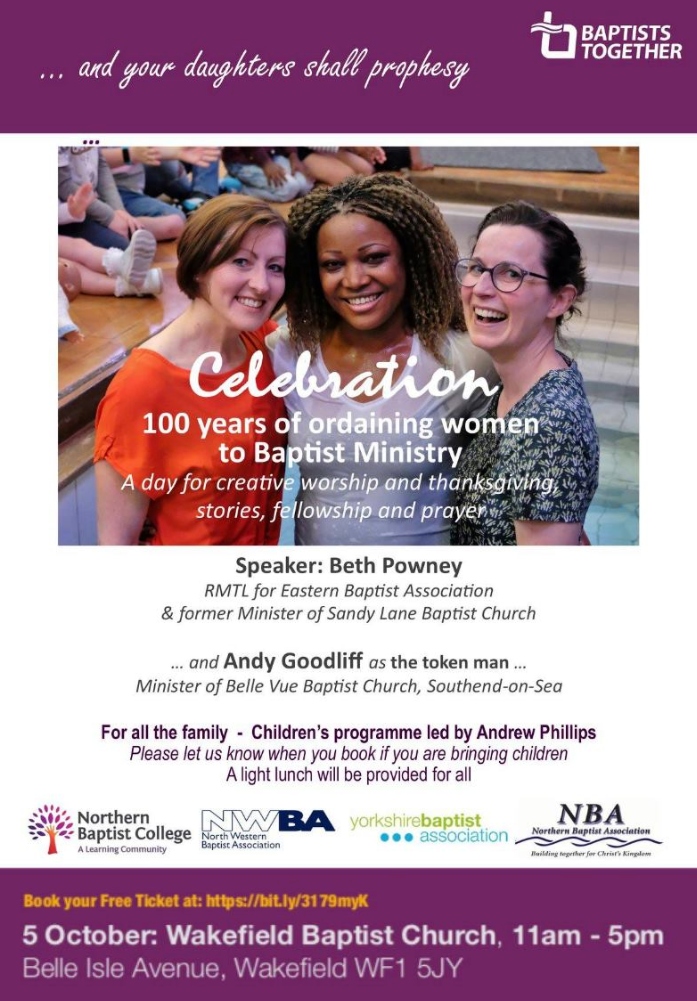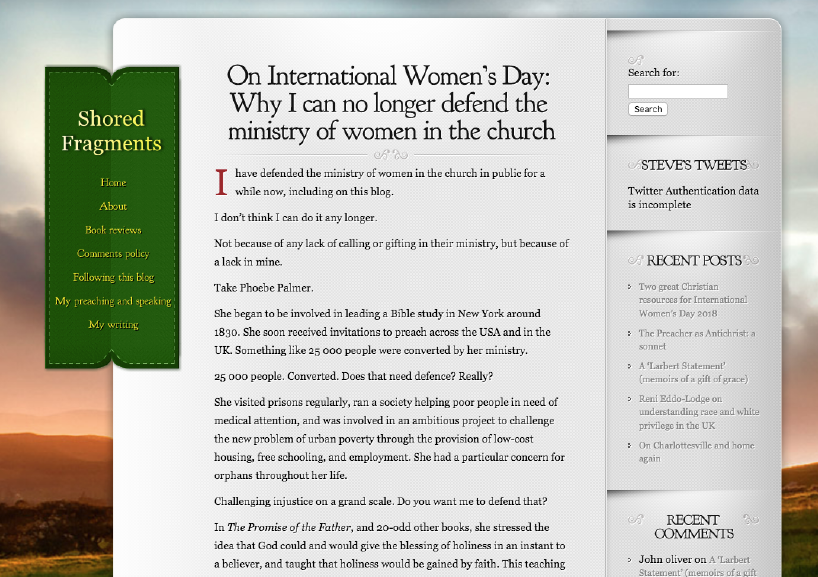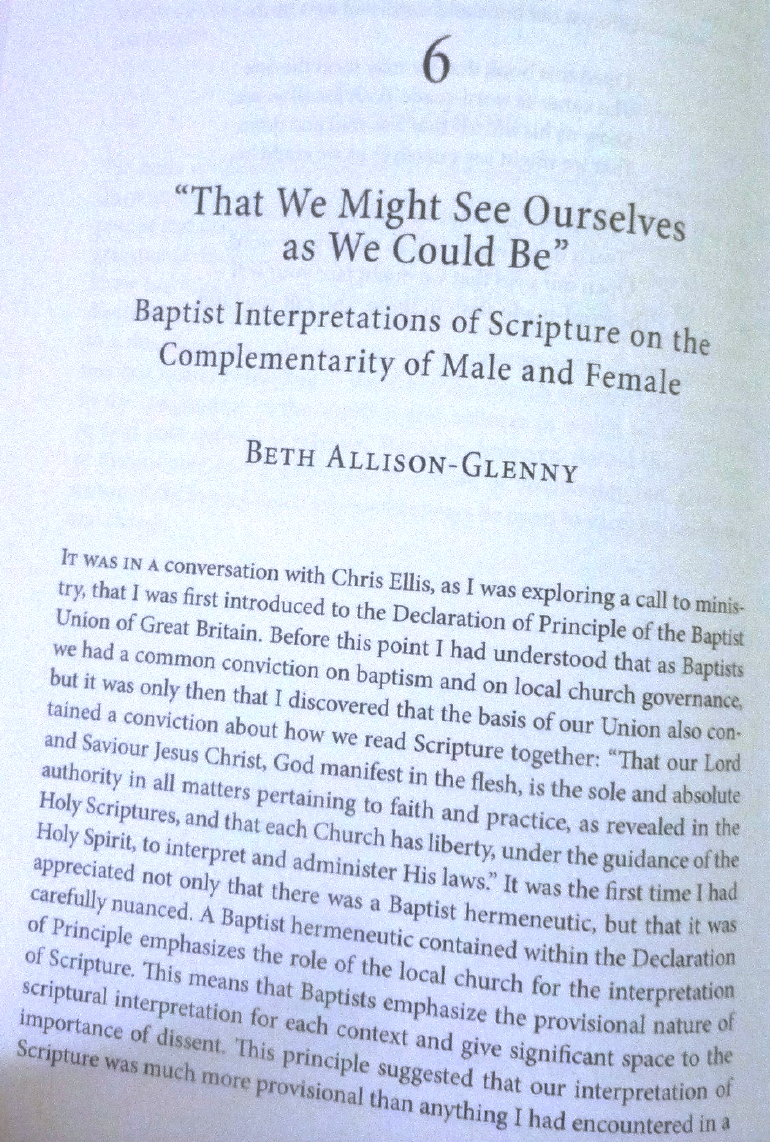A Token Man
Text of the address given by Andy Goodliff - the 'token man' at the 5 October event celebrating 100 years of ordaining women to Baptist ministry
 I am really pleased this event is taking place.
I am really pleased this event is taking place.
I am a little nervous that I might end up mansplaining.
I like talking, but on this occasion I wonder if my voice is needed.
That I was asked speaks to the generosity of organisers,
and perhaps, while wanting rightly to celebrate women in ministry,
to also show this is not a covert attempt to shut men up, well at least not entirely!
Over the years, it is fairly common to hear men (and sometimes women)
share how they came to change their mind about women in ministry.
They chart their great journey and struggle with the Bible from seeing only themselves as having the opportunity to be ministers and leaders, to a new place of acceptance.
Sometimes these stories are told in such a way as if women
should be grateful to have these men on their side!
That these stories are not rare demonstrates how prevalent a men–only view of ministry is still out there,
in our congregations, amongst Baptist ministers.
Of course it's not just a church and ministry thing,
it remains part of a wider patriarchy within society,
that the Christian church has been too slow to offer an alternative.
I don’t have that kind of story.
I can’t think of a moment ever where I did not think it was possible
for women to be leaders and pastors and ministers in the church.
Where this view came from I’m not sure.
Maybe it was because the first Prime Minister I knew was Maggie Thatcher!
(I hope that wasn’t the reason)
Neither of the two Baptist churches I grew up in the 1980s or 90s had women
ministers, or even women elders or deacons, at least initially.
So sadly I don’t think I had lots of examples,
they would come later into adulthood.
But I never had any sense that ministry or leadership was not open to women.
I can’t recall my mind changing.
Now as a minister of a church, I’m very conscious of the need for role models
and have tried to make sure not only do we have women leading from within the
church, on a Sunday morning and in the diaconate — it's actually a struggle to find
male deacons! — but also that I have invited women to preach.
We’ve had Myra Blyth, Ruth Gouldbourne, Sian Hancock and in a few weeks' time
we’ve got Beth Allison-Glenny coming.
I want my daughters and the other girls and women in the church to see women
leading, preaching, presiding,
to be open that this might be a calling on their life.
As I became more aware of what St. Paul says about women,
I took a dislike to the apostle for this and other reasons,
and largely put his views down to the culture of the time.
I have come to like the apostle a lot more,
and to finding readings of those apparent denial passages that actually
put Paul on the other side of the argument.
See the excellent work of Lucy Peppiatt on 1 Corinthians in this regard.
I believe, theologically and biblically that there is no barrier to women in ministry,
I don’t think the case for women in ministry needs to be made,
I think the case against women in ministry needs to be made,
and it always comes up short.
 In 2013 on International Women’s Day, my friend and fellow Baptist, Steve Holmes
In 2013 on International Women’s Day, my friend and fellow Baptist, Steve Holmes
said he was no longer going to defend the ministry of women in the church,
because it was so evident, in so many examples,
that God calls women to ministry in the church.
How can you defend it?
To defend it, he said, would be to try and illuminate the sun or to dampen the sea.
As it has been said, we ordain women, because we baptise girls.
Baptism is the only criteria for ministry.
Some have cheekily suggested that we need to make the case for the ordination of
men, that they are unsuitable for the ministry.
(Google ten reasons why men should not be ordained).
This might make us smile, but it of course, more seriously (and this was the intention
of the original author) recognises that for women the battle, the argument, the
struggle has to be made.
Which is why there were a number of voices in response to Steve’s post,
saying thanks, but actually we still need you to defend the ministry of women,
we need men making the case alongside women,
to demonstrate that this isn’t just a women’s issue,
but an issue for the whole church,
that to hinder and deny women in becoming ministers,
is to hinder and deny the work of the Holy Spirit, who calls and compels
people into this kind service in the church.
 In celebrating women’s ministry and the progress that has been made,
In celebrating women’s ministry and the progress that has been made,
still only relatively recently,
my friend Beth Allison-Glenny, would point out
there is still a temptation to say: we say yes to women in ministry
because their gender somehow brings something that complements an otherwise
male–only ministry.
So the argument goes:
we need women for their pastoral care, their sensitivity, their nurturing gifts,
their ability to multi-task, their willingness to serve.
To which Beth has rightly argued: ‘Er, no and no thank you.’
(Beth makes the case in more academic terms, that is my six–word summary.[1])
This view that women complement men in ministry reinforces a gender stereotyping
that gives women space to be ministers,
but at the same time keeps them in restrictive areas.
Here we need to watch, resist, subvert, call out, when that is being played.
I would want to support a move of getting rid of the language of assistant or
associate ministers, to embrace the language of co–minister or co–pastors
modelled now by two Baptist Colleges and a handful of churches.
We say yes to women in ministry,
because that is to be obedient to the work of the Holy Spirit,
and they came as they are:
leaders, preachers, pastors, evangelists, organisers, teachers, theologians.
I recently finished a PhD which in a one-line summary looked at some of what the
Baptist Union got up to in the 1990s, a decade of great change amongst English
Baptists.[2]
What I found was the conversations were almost all overwhelmingly between white
males. Women were largely absent from those conversations. 64 women out of 294
delegates were at the influential 1996 Denominational Consultation.
I’ve written a paper, out very soon, that is an attempt to tell the story of how women
struggled to become more present within the structures of the Union.[3] It took two
attempts in the 1990s to change the name of ‘Chairman’ of committees to
‘Moderator’ or ‘Convenor’, despite in a few cases women chairing these committees.
The first regional minister (then known as Superintendents) was not appointed until
1998;
the first women in non-admin role within Baptist house was not until 1992
(there has never been a woman leader of the big three departments of ministry, mission,
faith & unity, now Faith & Society); the first President of the Baptist Union was in
1978, then second in 1987 and the third not until 2006;
the first Deputy General Secretary of the Union was in 1999, and the first General Secretary was in 2013;
the first woman tutor in a Baptist College not until 1985, and the first woman Principal
was in 2009.
These shifts which as you can see took a long time coming, were cracks
in the glass ceiling to borrow the language of one Hilary Clinton, but we should not
presume, as I’m sure you know all to well, that the ceiling is now down.
There is a danger in saying we’ve sorted sexism because we’ve got a woman General
Secretary, but just as electing a black President in the United States was a positive
sign, racism by no means disappeared and it might be suggested that backwards
steps have taken place.
I am the token man today,
I am the token man whose ministry is never questioned,
who has never had anyone walk out of a service, or refuse to be served Communion,
at least not on the account of my gender.
I am the token man, whose existence as a minister is relatively secure,
at least in housing and financial terms,
and in opportunity if I feel the call to seek a new ministry in another church.
I am the token man, who has four theology degrees,
edited two books and with some more in the pipeline.
I am the token man, who is connected, whose name is known to a certain degree
within Baptist circles, partly by virtue of family connection and from being a bit
mouthy.
I’m sorry its been relatively easy for me where this has been on my account of my
gender.
I’m sorry that we have a system that still means there is a likelihood that it will be
less straightforward for you.
I’m sorry for where men like me have not made enough noise, have not taken a stand with you.
I pray days like this one today will mean the journey to becoming a minister and the
life of being a minister will see some of those hurdles, some of that toxic culture,
become less.
As a token man today,
what would I want to say to my brothers in ministry?
I might say look at your book shelves —
how many of your books are written by white western men?
How might your ministry be impacted if you read some other voices?
Here’s a list of names to get you started:
Carolyn Sharp, Ellen Davis, Phylis Trible, Kathleen O’Connor,
Beverly Gaventa, Paula Gooder, Morna Hooker, Lucy Peppiatt
Sarah Coakley, Jane Williams, Kathryn Tanner,
Lauren Winner, Nicola Slee, Ruth Gouldbourne, Fleming Rutledge
Or simply get a companion, or reader, or introduction to feminist theology.
You’ll find your preaching, your ministry more interesting.
I might say when was the last time you preached a sermon on a woman in the Bible?
How might your church be impacted if they began to recognise the myriad of ways
that women initiate, respond, transform stories in the life of Israel, the life of the
gospels and the early church?
You’ll find your sermons more interesting.
I might say look at your preaching/leading rota?
How might your ministry, and your church be impacted if there was some more
balance in who was given the microphone?
And if there are not yet women in the place to do that, invite women in, and if there
are the means create a pot of money for women to get training, education.
You’ll find your services more interesting.
I might say where women are in leadership within your church, what are there
roles?
Do women tend towards pastoral care? Why is that? Could it be done differently?
You’ll find your church more interesting.
I might say look at your local gathering of ministers?
If there are any women present, what might it be like for them to be there,
to be seen, to be seen as an equal when they are more than likely in the minority?
You’ll find your local networks more interesting.
Perhaps more important is to ask you,
what would you have me say, what would you have me do?
Labouring God
who works for the newness of life and creation,
deliver us from the sin of believing you are male,
and that those you call to leadership must be male.
Grant us the gift of joy in seeing the power of the Holy Spirit
resting upon women and men
whom you call and compel,
to serve in your kingdom and church
as midwives likes Shiphrah and Puah
as leaders like Deborah
as committed companions like Ruth
as prayers like Hannah
as prophets like Huldah
as carriers of grace like Mary of Nazareth
as evangelists like Mary of Magdala
as pastors like Lydia
as teachers like Priscilla
as apostles like Junia
in Jesus’ name.
Amen.
Andy Goodliff is the minister of Belle Vue Baptist Church, Southend
[1] Beth Allison–Glenny, “Baptist Interpretations of Scripture on the Complementarity of Male and Female” in Blyth and Goodliff (eds.), Gathering Disciples (Pickwick, 2017)
[2] Andrew Goodliff, Renewing a Modern Denomination (PhD, St. Andrew’s, 2018)
[3] Andy Goodliff, ‘Women and the Institution’, Journal of Baptist Theology in Context 1 (2019)
Baptist Times, 08/10/2019